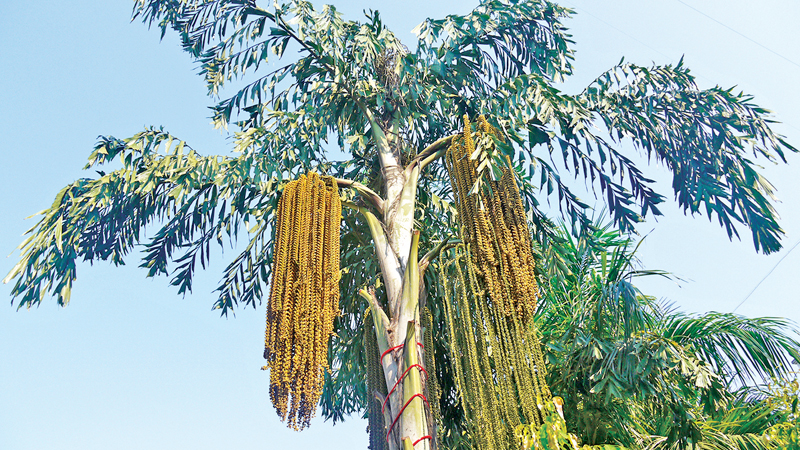After the coconut tree, the kithul tree that stands majestically throughout the wet and semi-wet zones in Sri Lanka can be called the kapruka or the ‘fortunate tree’ which supplies us with several benefits throughout the year.
We obtain delicious treacle from its flower and nutritious flour from its pith. Its steel-like timber is used to make a variety of items and furniture. The kithul tree grows well especially in hilly areas in the Sripada range. Erathna, Mahawattalanda, Gileemale and Deraniyagala are some of the areas 1,000 to 6,000 feet above sea level where this tree grows very well.
 L.K. Priyantha Kumara |
Thellijja obtained from the kithul flower is converted into treacle or jiggery. Flour is made out of its trunk and used to prepare gruel and other food items. The ayurveda system of treatment believes that kithul products are capable of controlling high blood pressure and cholesterol levels.
Kithul is also an alternative to sugar. Apart from that, this tree with its strong cluster of roots helps to prevent soil erosion.
Among the firms that deal with the kithul treacle and timber in Sri Lanka, Eheliyagoda Eco Products in Araliya Uyana, Baduwatte, plays a leading role. This institution established by L.K. Priyantha Kumara in 2001 won the first place at the Kithukaka Waruna all-island competition in 2011 plus several awards related to the kithul industry.
Priyantha Kumara told the Daily News that the aim of his venture is to obtain the ‘hidden treasure’ from the kithul tree and to uplift the living standards of the women and youth who deal with kithul-based products.
A considerable number of food products such as treacle, flour, syrup, ice cream and jaggery are made by this venture under strict hygienic conditions. These products are distributed among the leading hotels under the trade name Mihirasa Eco Products and exported to six countries including Japan under the trade name Lanka Pure Kithul.
Extra-strong kithul timber is used in making household items such as kitchen mortars and pestles, door planks, axe handles, stools, wall decorations, plates, cups and saucers, spoons, combs, key tags and more.
According to Priyantha Kumara, groups of kithul tappers are called to the firm from time to time and awareness programmes are held on how to obtain more treacle from the kithul flower perennially. Kithul plants and safety equipment sets are also presented to them.
Recently, an air rifle worth Rs.25.000 was also presented to a kithul tapper to scare away the troublesome red monkeys that damage the kithul flowers. “We hope to provide free air rifles to every kithul tappers’ society,” said Priyantha Kumara. “We have started to plant one lakh of kithul saplings in selected areas and hope to establish a modern training centre for the newcomers to the field.”
Lanka Eco Products has taken steps to cover eight districts in the island including Ratnapura, Kegalle, Kandy and Kalutara. According to a study conducted throughout the island, there are about 3,000,000 kithul trees and around 500,000 are being tapped. There are around 25,000 active kithul tappers and about 5,000 provide kithul products to Lanka Eco Products.
The monthly income of a tapper is about Rs. 40,000. To make a bottle of kithl treacle, six thellijja bottles are needed. Nine thellijja bottles are needed to made a kilo of jaggery.
Lanka Eco Products recently opened a cafe and sales centre by the name Kithula close to Eheliyagoda town, by the side of the Ratnapura road for the convenience of customers.
“To uplift the kithul industry, several institutions have given us encouragement and support. The Small Scale Agro Business Participation Programme of the Mahaweli Ministry, United Nations Development Programme and International Organisation of Consumers Unions (IOCU) are assisting us,” said Priyantha Kumara.



